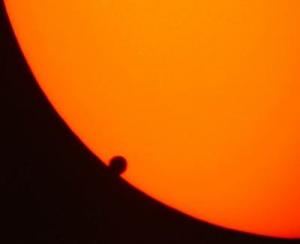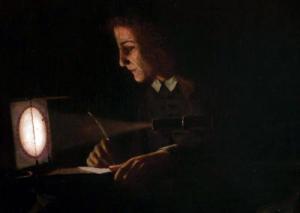On science blogs this week: Cycles
THE TRANSIT OF VENUS. I hope you saved your protective glasses from last week's solar eclipse. You'll need them again next week for the transit of Venus across the Sun — your last chance ever to observe this event, since the next one won't be until 2117. It's literally a once-in-a-lifetime experience — unless, of course, you paid attention during the last one in 2004.
You have your choice of a planetful of blog posts marking this mini solar eclipse, but here is a handful of the noteworthy.
Not to be missed: At the inaptly named Bad Astronomy, Phil Plait tells you everything you wanted to know, not forgetting things you didn't know you wanted to know about witnessing the transit next Tuesday and Wednesday, June 5 and 6, depending on where you are on this planet. And I mean everything: Fast facts about the transit. How to observe it SAFELY! We're not kidding about those glasses or comparable protection. If you can't shield your eyes, watch online at your choice of sources, which he also lists. Plus many resource links to wander through.
Astronomy was once quite a dangerous profession. At Cocktail Party Physics, Jennifer Ouellette guides you through some of the star-crossed previous efforts to observe the transit, often foiled by cloudy weather, not to mention fatal to dozens sailing to and from the event. First to record it, in 1639, was 20 year-old Jeremiah Horrocks, who was at the right place at the right time because he figured out that Johannes Kepler had made a math error and got the transit date wrong. In 1769, transit-watchers at 76 observation posts worldwide, including the astronomer accompanying Captain James Cook in Tahiti, made inaccurate measurements of the transit and so failed to achieve the goal of the observations, which was to calculate the size of the solar system.
OTHER NOTABLE TRANSIT OF VENUS POSTS. At The Guardian's Notes & Theories, Stuart Clark claims that the 1761 Transit of Venus launched Big Science, becoming the 18th-Century equivalent of the Large Hadron Collider. The 18th-Century equivalent of a World War was going on too, but still some 200 astronomers participated. Jean-Baptiste Chappe d'Auteroche took an armed guard of Cossacks with him to watch the show from Siberia. He was the only astronomer to observe both the 1761 and 1769 events. For the latter he went to Baja California, but that one killed him.
Mark Anderson delves into even more history at The Blog at HuffPo. including grisly details not only from Chappe's Baja expedition, but what two Austrian astronomers went through to conduct observations from the Arctic for the 1874 Transit.
Also at Notes & Theories, Helen Czerski explains how next week's Transit measurements may help astronomers test new spectroscopic techniques for analyzing possible atmospheres on exoplanets.
There's a nice infographic Transit observer's guide at Space.com. And if you haven't had enough, Space.com also promises complete coverage. So does, as you may imagine, transitofvenus.org.
SPEAKING OF TIME, WE GOT RHYTHM. You may know Bora Zivkovic as co-organizer of the annual ScienceOnline blogfests in North Carolina and/or as Scientific American's blog czar and/or as a tireless tweeter, not to mention re-tweeter. But Bora has another life too, as a chronobiologist, hence the title of his Blog Around the Clock.
Here he rounds up recent papers in chronobiology, subjecting them to intensive analysis. Chronobiologists think that all the major clock genes have been discovered, Bora says, and so they have turned their attention to circadian rhythms in the brain, evolution, reproduction, cancer, and, especially, metabolism.
BIOETHICS ISSUE OF THE WEEK. At Neurophilosophy, Mo Costandi writes about the science and ethics of amputation as a treatment for Body Identity Integrity Disorder. He votes yes, in some cases at least, arguing that skilled surgery is preferable to a patient trying amputation on himself.
HORMONE THERAPY FOR MENOPAUSE: CONSENSUS AFTER 10 YEARS. The arguments over whether menopausal women should be prescribed sex hormones like estrogen have been fierce, but it does seem that a consensus has formed around the idea that post-menopausal hormones are OK for most of the women who suffer from miserable symptoms like hot flashes.
You wouldn't know it, though, from the hed on the Wall Street Journal's Health Blog post, which declared that the U.S. Preventive Services Task Force "recommends against hormones for post-menopausal women." Poor USPSTF, still bruised from its recent recommendations against PSA testing for prostate cancer and now calumnied about hormone therapy. That isn't what it said. At least Jennifer Corbett Dooren got it right in the post itself, declaring that USPSTF was "recommending against hormones for preventing fractures, dementia and other chronic diseases in women who are already past menopause." Which is a very different thing.
The hed was nearly correct on a May 22 WSJ post by Melinda Beck, reporting on hormone therapy recommendations from the International Menopause Society. It said "Benefits of Hormone-Replacement Therapy Outweigh Risks, Reviews of Studies Show." This is true for women who start hormones around the time of menopause. The Women's Health Initiative studies that revealed health risks and caused so much consternation a decade ago assessed hormone therapy begun by women who on average were more than 10 years beyond menopause; in fact, some were in their 70s and even 80s. Deborah Kotz did a very nice job summarizing the controversy's complexities at Daily Dose.
HOW TO WRITE A BOOK. Writing a book isn't like any other kind of writing; authors need different strategies and a different mindset. (Also a lot more time, but I guess that's a different issue.)
Charles Choi, a fine science journalist who has apparently not (yet) written a book, consulted 5 other fine science journalists who have in order to learn how they approach the switch from short forms to a long one. Find his piece at The Open Notebook ("The story behind the best science stories.")
A brief sampling of the wisdom therein: Maggie Koerth-Baker advises asking yourself why your pet topic needs to be a book rather than something shorter. David Dobbs says you must ask a million questions, and then a million more, even though you know you won't use 90% of what you find out.
Carl Zimmer emphasizes history, something there isn't time for when you're doing news. Maryn McKenna had to learn how to cast off her reporter's dispassion and get comfortable with interpretation. Deb Blum says she obsesses about structure. Having read The Poisoner's Handbook and heard her talk about working out how to build it, I believe her.


